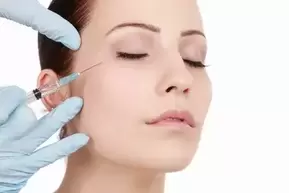Safety Consideration: BOTOX® Cosmetic
What is the most important information I should know about BOTOX® and BOTOX® Cosmetic?
Problems swallowing, speaking, or breathing
These problems can happen hours to weeks after an injection of BOTOX® or BOTOX® Cosmetic usually because the muscles that you use to breathe and swallow can become weak after the injection.
Death can happen as a complication if you have severe problems with swallowing or breathing after treatment with BOTOX® or BOTOX® Cosmetic. People with certain breathing problems may need to use muscles in their neck to help them breathe. These patients may be at greater risk for serious breathing problems with BOTOX® or BOTOX® Cosmetic.
Problems with swallowing may last for several months. People who cannot swallow well may need a feeding tube to receive food and water. If swallowing problems are severe, food or liquids may go into your lungs. People who already have swallowing or breathing problems before receiving BOTOX® or BOTOX® Cosmetic have the highest risk of getting these problems.
Death can happen as a complication if you have severe problems with swallowing or breathing after treatment with BOTOX® or BOTOX® Cosmetic. People with certain breathing problems may need to use muscles in their neck to help them breathe. These patients may be at greater risk for serious breathing problems with BOTOX® or BOTOX® Cosmetic.
Problems with swallowing may last for several months. People who cannot swallow well may need a feeding tube to receive food and water. If swallowing problems are severe, food or liquids may go into your lungs. People who already have swallowing or breathing problems before receiving BOTOX® or BOTOX® Cosmetic have the highest risk of getting these problems.
Spread of toxin effects
In some cases, the effect of botulinum toxin may affect areas of the body away from the injection site and cause symptoms of a serious condition called botulism. The symptoms of botulism include:
- loss of strength and muscle weakness all over the body
- double vision
- blurred vision and drooping eyelids
- hoarseness or change or loss of voice (dysphonia)
- trouble saying words clearly (dysarthria)
- loss of bladder control
- trouble breathing
- trouble swallowing
What is BOTOX®?
BOTOX® is a prescription medicine that is injected into muscles and used:
- to treat increased muscle stiffness in elbow, wrist, and finger muscles in adults with upper limb spasticity.
- to treat the abnormal head position and neck pain that happens with cervical dystonia (CD) in adults.
- to treat certain types of eye muscle problems (strabismus) or abnormal spasms of the eyelids (blepharospasm) in people 12 years and older.
What is BOTOX® Cosmetic?
It is a prescription medicine that is injected into muscles and used to improve the look of moderate-to-severe frown lines between the eyebrows (glabellar lines) in adults younger than 65 years of age for a short period of time (temporary).
It is not known whether BOTOX® is safe or effective in children younger than:
- 18 years of age for treatment of spasticity
- 16 years of age for treatment of cervical dystonia
- 18 years of age for treatment of hyperhidrosis
- 12 years of age for treatment of strabismus or blepharospasm
Who should not take BOTOX® or BOTOX® Cosmetic?
Do not take BOTOX® or BOTOX® Cosmetic if you:
- are allergic to any of the ingredients in BOTOX® or BOTOX® Cosmetic. See the end of the Medication Guide for a list of ingredients in BOTOX® and BOTOX® Cosmetic
- had an allergic reaction to any other botulinum toxin product such as Myobloc® or Dysport®
- have a skin infection at the planned injection site
What should I tell my doctor before taking BOTOX® or BOTOX® Cosmetic?
Tell your doctor about all your medical conditions, including if you have:
- a disease that affects your muscles and nerves (such as amyotrophic lateral sclerosis [ALS or Lou Gehrig’s disease], myasthenia gravis or Lambert-Eaton syndrome). See “What is the most important information I should know about BOTOX® and BOTOX® Cosmetic?”
- allergies to any botulinum toxin product
- had any side effects from any botulinum toxin product in the past
- a breathing problem, such as asthma or emphysema
- swallowing problems
- bleeding problems
- plans to have surgery
- had surgery on your face
- weakness of your forehead muscles, such as trouble raising your eyebrows
- drooping eyelids
- any other change in the way your face normally looks
- are pregnant or plan to become pregnant. It is not known if BOTOX® or BOTOX® Cosmetic can harm your unborn baby
- are breastfeeding or plan to breastfeed. It is not known if BOTOX® or BOTOX® Cosmetic passes into breast milk
It is important to inform your doctor if you:
- have received any other botulinum toxin product in the last four months
- have received injections of botulinum toxin, such as Myobloc® (rimabotulinumtoxinB) or Dysport® (abobotulinumtoxinA) in the past. Be sure your doctor knows exactly which product you received have recently received an antibiotic by injection
- take muscle relaxants
- take an allergy or cold medicine
- take a sleep medicine
How should I take BOTOX® or BOTOX® Cosmetic?
- BOTOX® or BOTOX® Cosmetic is an injection that your doctor will give you.
- BOTOX® is injected into your affected muscles or skin.
- BOTOX® Cosmetic is injected into your affected muscles.
What should I avoid while taking BOTOX® or BOTOX® Cosmetic?
BOTOX® and BOTOX® Cosmetic may cause loss of strength or general muscle weakness, or vision problems within hours to weeks of taking BOTOX® or BOTOX® Cosmetic. If this happens, do not drive a car, operate machinery, or do other dangerous activities. See "What is the most important information I should know about BOTOX® and BOTOX® Cosmetic?"
What are the possible side effects of BOTOX® and BOTOX® Cosmetic?
BOTOX® and BOTOX® Cosmetic can cause serious side effects. See "What is the most important information I should know about BOTOX® and BOTOX® Cosmetic?"
Other side effects of BOTOX® and BOTOX® Cosmetic include:
Call your doctor for medical advice about side effects. You may report side effects to FDA at 1-800-FDA-1088.
Other side effects of BOTOX® and BOTOX® Cosmetic include:
- dry mouth
- discomfort or pain at the injection site
- tiredness
- headache
- neck pain
- eye problems: double vision, blurred vision, decreased eyesight, drooping eyelids, swelling of your eyelids, and dry eyes
- allergic reactions. Symptoms of an allergic reaction to BOTOX® or BOTOX® Cosmetic may include: itching, rash, red itchy welts, wheezing, asthma symptoms, or dizziness or feeling faint. Tell your doctor or get medical help right away if you are wheezing or have asthma symptoms, or if you become dizzy or faint
Call your doctor for medical advice about side effects. You may report side effects to FDA at 1-800-FDA-1088.
General information about BOTOX® and BOTOX® Cosmetic
Medicines are sometimes prescribed for purposes other than those listed in a Medication Guide.
The Medication Guide summarizes the most important information about BOTOX® and BOTOX® Cosmetic. If you would like more information, talk with your doctor. You can ask your doctor or pharmacist for information about BOTOX® and BOTOX® Cosmetic that is written for healthcare professionals. For more information about BOTOX® and BOTOX® Cosmetic call Allergan at 1-800-433-8871 or go to www.botox.com.
The Medication Guide summarizes the most important information about BOTOX® and BOTOX® Cosmetic. If you would like more information, talk with your doctor. You can ask your doctor or pharmacist for information about BOTOX® and BOTOX® Cosmetic that is written for healthcare professionals. For more information about BOTOX® and BOTOX® Cosmetic call Allergan at 1-800-433-8871 or go to www.botox.com.
General information about BOTOX® and BOTOX® Cosmetic
Active ingredient: botulinum toxin type A
Inactive ingredients: human albumin and sodium chloride
Inactive ingredients: human albumin and sodium chloride


